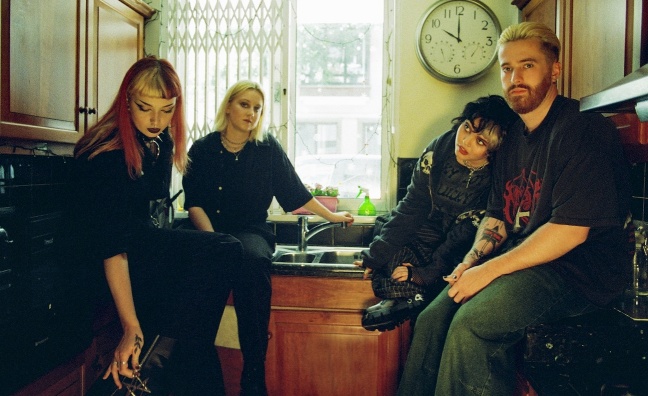Having signed to Polydor after debut single Come Over (Again) became a viral sensation, Merseyside quartet Crawlers are ready to lead the charge for Gen Z rock in 2024.
The band's debut album, The Mess We Seem To Make, is chasing a Top 3 finish this week. In the latest Midweek Sales flash, the LP is at No.3 with 4,617 sales so far behind Idles and Paloma Faith.
Here, vocalist Holly Minto unpacks the pressures of their debut album and lays bare the expensive realities of touring in a post-Brexit world…
INTERVIEW: DAVID McLAUGHLIN PHOTO: MEGAN DOHERTY
Your debut album The Mess We Seem To Make is rife with vulnerability. Do you feel ready to share that with the wider world?
“The vulnerability comes from us tackling taboo topics such as sexual trauma and drugs. We were nervous writing about that stuff, but the main vulnerability came for us as musicians. Whether it was due to Covid and self-doubt, or just us being a womxn band, but to feel accepted as a musician sometimes you feel the need to prove your virtuosity. But what is that for if it’s not for the benefit of the song? At some point, each one of us had that breakthrough realisation. We all cried at least once making this record. It’s hard when you’re on your debut. You really have to put your blinkers on and not compare what you’re doing to anything else. Sometimes that pressure can weigh really heavily. But we’re ready to share it.”
What have you learned from the act of sharing such personal stories?
“It was tough. A lot of these songs embody the insecurities of growing up in a generation of over-sharers who have nowhere else to go. Instead of putting this stuff on a Tumblr post, now I’m putting it on an album. This is all the stuff that affected me growing up. I wonder if I would be a different person if these things hadn’t happened. But being able to explore them with my friends has allowed me to understand myself a lot more. I don’t believe that I’m special or the voice of broken people or anything. I’m 24 and only just opening up with my family about all the secret things I was up to as a kid. Now I’m trying to be more heart-on-sleeve, not just in my writing, but in life.”
There aren’t a huge number of rock bands on majors these days. What made Polydor the right home for Crawlers?
“I’ve got a funny story about this. I went to LIPA uni and in my first big lecture Tom March [Geffen Records president and former Polydor co-president] had come to do a talk. He was young, hungry and did a case study on Yungblud, Sam Fender and Celeste that made my jaw drop. I felt so inspired. When everyone left the lecture hall, I was the last one out, I grabbed his hand and I said, ‘I’ll see you soon, Tom.’ When we were being chased by people, I was very aware of every label, their roster and what they had to offer, but Polydor were the only
ones winning us over with facts. There was no bartering. We had a creative vision and they respected that this wasn’t just a quick buy-in on a viral TikTok hit.”
Has it sunk in that you’re now labelmates with Lana Del Rey, The Rolling Stones, Lady Gaga and more…
“Honestly, it’s like, ‘What the fuck?!’ When we got our first email about it I was still living off rice because I was so broke. In one tab my card was being declined for groceries and in the other I had Polydor sliding into our DMs. I took my shot. Imagine if we were shit! I’d only been to London once on a school trip, suddenly I was there all the time to see labels and it was bizarre.”
How are you finding the rising financial challenges of touring?
“You need financial backing. If you want to break America you have to go, but it’s like 50 grand minimum. We’ve had to cancel a US tour for that reason. Europe has gone that way too, as a result of Brexit. There are carnets involved, ferries are more expensive and it’s way more complicated now. I’ll never get over the day we signed for Brexit. It was my prom night, I was 16 and aware of the implications. Now I’m 24 and living through those repercussions, having to spend a lot more money to see some of our biggest fans.”
For the next generation of artists, what do you foresee as the long-term impact of this?
“If you’re an up-and-coming, working-class band with no financial backing, you’re not going to be able to tour, no matter how many sacrifices you make. It’s too expensive. You need to hire a van, you need a driver and good luck bringing merch across borders. I can’t imagine how artists are going to do it on their own if they can’t afford to travel.”









